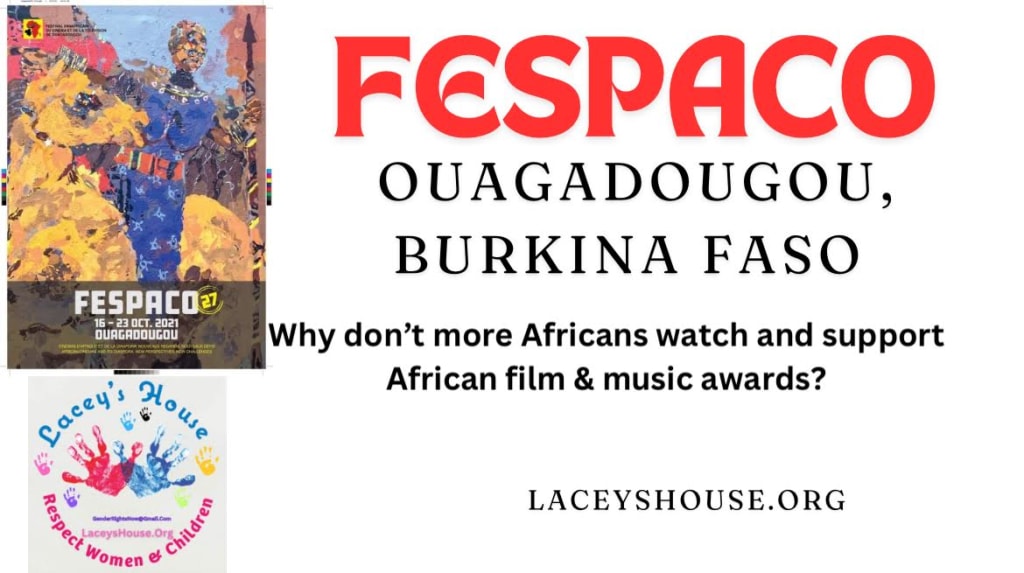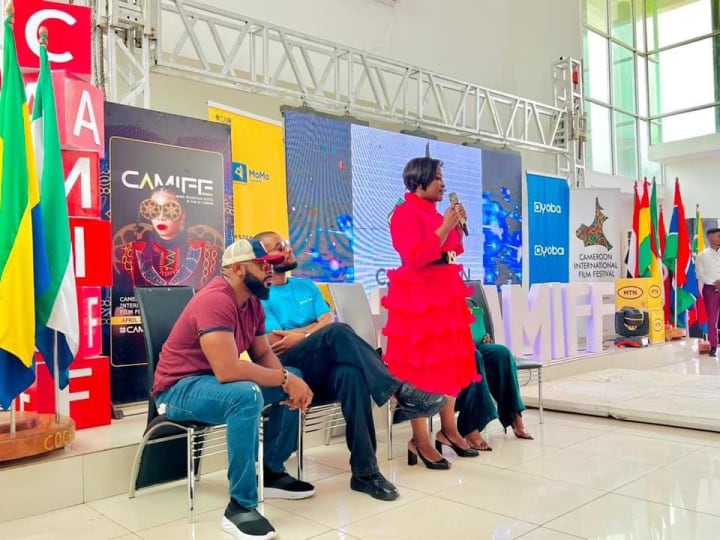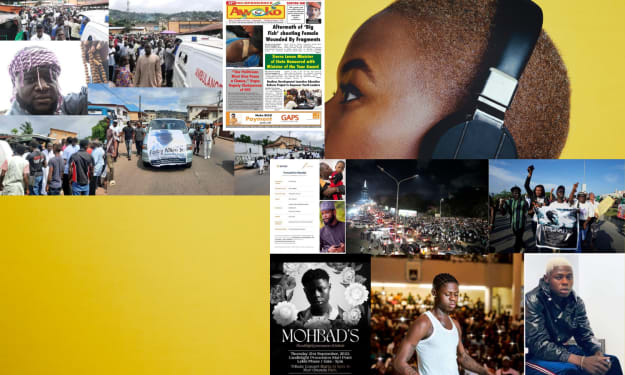Why Do So Many Africans Ignore FESPACO & Other Big African Film & Music Awards Programs?
While Africans lament of the Grammy's & American music awards they ignore their own

Friday, 26 April 2024
By: TB Obwoge
Currently in Cameroon, they're having their international movie awards. The Cameroon International Film Festival (CAMIFF) takes place from, April 22–27, 2024, and includes honorary awards.
The Cam Movies Merit Award (CMMA) is also headquartered in Buea, Cameroon, its intended to promote artistic talent and appreciation. However a social media influencer on his Facebook page would share photos from the events taking place. He noted that there were under 20 thousand people following the official Facebook account of the movie awards page.
He then noted how the page had grown to over 30,000 from his posts, he also encouraged people to go follow the page, show support and share posts.
This reminded me of the Burkina Faso, awards dubbed the FESPACO, for short (Festival panafricain du cinéma et de la télévision de Ouagadougou) which is French for Pan-African Film and Television Festival of Ouagadougou.
This is a biennial film festival that takes place in Ouagadougou, Burkina Faso, the capital city of Burkina Faso.
This is also where the organization is based. FESPACO is considered one of the largest cultural events on the African continent.
The why don't more Africans support, watch and know about this film festival? Watching the last awards program, there were even actors that didn't bother to show up to accept awards that they were nominated for.
Currently the FESPACO official Facebook account has about 49,000 followers, there are over 1.4 billion Africans on the continent. Why aren't millions following this account?
The Recording Academy known as the Grammy's, has 5.2 million followers, Academy of Motion Picture Arts and Sciences aka, The Academy also known as the Oscar's has 3.5 million followers.
There are African news outlets that have millions of followers, yet these 2 film awards programs, only has several thousand followers, both far from just 1 million.
Why aren't Africans following their own? I have often wondered this, as many dream of immigrating to western countries, I have always wondered why they don't want to immigrate to other African countries instead.
I mean its no disrespect to them but there are so many wonderful African countries to live in, there are jobs as well as some very accepting countries. I wish that in my travels I had traveled to more African countries. Even wish that I had moved years ago and taken my daughter to live where she could have gotten better knowledge of the world around her.
I really hate having regrets, even worse I hate that I didn't know that there were so many wonderful places where I could've built a beautiful and peaceful life for myself.
Here is some information about some of the many flim and music festivals in Africa.
AMVCA - Africa Magic Viewers' Choice Awards
Africa Magic Viewers' Choice Awards is an award show presented by MultiChoice recognising outstanding performances in television, film, entertainment and now in digital content creation throughout Nollywood and the entire African content. The annual AMVCA ceremony for 2023 will be held in Lagos, Nigeria on 20 May and will be broadcast live on all Africa Magic channels.
Source AMVCA Official Web Page

The Cameroon International Film Festival - CAMIFF
The Cameroon International Film Festival - CAMIFF is establish with the aim to help create a vibrant film culture throughout the region. Every May the event will be committed to curating exceptional programs to engage and educate the local community, inspire filmmakers and nurture the growth of the Cameroon and African film industry. with it's commitment to presenting works of Cameroonian filmmakers in competition alongside those by major talent of the world cinema.
CAMIFF offers Cameroon diverse and enthusiastic audience a means of engaging with their own and others culture through the art of CINEMA. At the same time, a strong focus on the CAMIFF as a place for the world to discover and gauge the pulse of recent Cameroon and African films/filmmakers.
Fashion and culture play a huge part in all of these awards shows. The beauty of everything makes the awards worth following. I can't imagine why Africans wouldn't want to celebrate other Africans, see their stars shinning bright and getting acknowledged for their hard work.
Instead most Africans seen to think winning American awards and following American wards programs are more of a status. This is sad, it shows that even most Africans don't love others, how can someone like myself have such love and knowledge on these things?
Many Africans have even called me stupid when I tell them that there are 55 African countries in the African Union. One man insulted me when I told him that Burundi was listed as a Central African country on the African Unions web page.
I will be a forever foreigner in Africa, I will not even be considered the Black woman I am but I will always love and respect the richness of the continent. My first African movie awards, the one that I loved and followed was the FESPACO.
You can watch the awards streaming live from your very own Facebook account. They are a mix of multiple languages, the hosts mostly spoke in English though.
Africans Angry Over Not Enough Inclusion In American National Music Awards: African Awards Don't Award Korean or American Musicians
A Ghanaian-American has taken to complaining that a national award program created in America, for Americans isn't doing enough to award Africans. Angry that Africans living on the continent of Africa aren't receiving enough awards from a country across the ocean.
This same thing happened with the BET (Black Entertainment Awards) awards has added African artist and Burna Boy a Nigerian won an award this year yet didn't even bother to attend the awards show in held in the United States.
There are several African music awards all over the African continent. Ghana for example has the VGMA awards (Vodafone Ghana Music Awards) Not one of the categories created in their awards show is for anyone outside of their nation, which means country
Source Vocal Media Iwritemywrongs
Fespaco: past present and future
Since its founding in 1969, the Festival Panafricain du Cinéma et de la Télévision de Ouagadougou – popularly known as Fespaco – has built a reputation as Africa’s most important film festival. Earlier this year, a panel of key Fespaco contributors convened in London to honour the festival’s legacy. Nadia Denton, the driving force behind the ‘Beyond Nollywood’ initiative, was present to capture the highlights.
For over five decades, Fespaco has been the premier arena for reaffirming and celebrating Africa and its global diaspora on the big screen. Widely regarded as a site of pilgrimage among filmmakers and industry figures from the African diaspora, the Burkina Faso-based festival’s cultural significance is due to its status as a truly pan-African space to discuss, debate and analyse the problems confronting modern African cinema. “Nowhere are so many African films shown at once; nowhere do so many African filmmakers ever come together,” remarked the influential Senegalese filmmaker Ousmane Sembène, a founding father of the festival, which, at its peak in the pre-Covid years, attracted more than 500,000 local and international spectators.
Government-organised since its inception, Fespaco has been beset with challenges over the last decade: problems with curation, event management, marketing and promotion have risked alienating festival-goers, threatening Fespaco’s reputation as the greatest film festival on the African continent. Yet many still loyal to the pan-African ideals upon which the festival was founded continue to strive to restore it to its former glory. Among them is Black Film Bulletin founder and film archivist Dr June Givanni.
The archiving of African cinema
In the summer of 2023, the June Givanni Pan African Cinema Archive enshrined the memory and legacy of Fespaco in an exhibition named ‘PerAnkh’, a showcase of the Archive’s treasures, hosted at the Raven Row gallery in London. A series of events ran alongside the exhibition; of particular note was a panel discussion titled ‘Fespaco and the Archiving of African Cinema’, which assembled such African industry luminaries as the filmmakers Mohamed Challouf and Jihan El-Tahri and the curators Aboubakar Sanogo and Keith Shiri. Chaired by Givanni, the conversations recounted in dramatic detail the highs and lows of Fespaco, giving both personal and professional context to the history of the festival, which in recent times has drawn increasing criticism from the filmmaking community it set out to serve. The spirit of Fespaco was ever-present, with lively, provocative outbursts from panelists and audience members alike – “Fespacoesque”, as El-Tahri put it.
El-Tahri, who is Egyptian, shed light on what made the 50-year-old festival so unique for African filmmakers, passionately describing it as “the only place where people from the Global South have their own space: we are not visitors there, we can talk together, there is a sense of safety – we are not being judged. We can be who we are in our different articulations, languages and aesthetics.” Irrespective of its flaws, Fespaco still rivals many lauded Western festivals in the minds of film practitioners from the Global South.
Reflecting on Fespaco’s intentions towards African filmmakers and the extent of its decolonial ambitions, El-Tahri remarked: “In the francophone African colonies, the ‘image’ was forbidden to the ‘natives’. [These restrictive strategies existed in anglophone territories too, and were referred to as ‘specialised technique’.] It was not until the early 1960s [albeit decades earlier in Egypt] that the idea of who we were as Africans was transmitted through our own eyes in dramatic feature films… we could represent and film ourselves. The way that external powers could control that space was by stopping the funding and distribution, and that was what Fespaco tried to break.”
In the 1990s, the festival began to encompass a younger generation of filmmakers, moving beyond the dominance of the old guard. “These founding fathers [such as Ousmane Sembène] were always there, but there was little engagement with the younger generation,” recalled El-Tahri. “Then, in 1995, there was a movement to have a stronger voice from the second generation, and the Guild of African Filmmakers in the Diaspora was created. Most of us rarely had our films shown in our own countries, and so a lot of African filmmakers who were part of the Guild were those making films that would compete internationally.” To ensure it maintained its pivotal platform on the continent, Fespaco had to embrace changing demand.
Sankara’s reputation as something of an African Che Guevara made attendance at the festival even more attractive to filmmakers and artists who saw themselves as part of a pan-African film movement. But in 1987, at the age of 37, Sankara was killed in another coup led by his former friend and co-revolutionary Blaise Compaoré. During Compaoré’s rule, which lasted until 2014, Challouf’s 2000 documentary about Fespaco, Ouaga: Capital City of Cinema, was banned – though it was eventually shown at Il Cinema Ritrovato on the 50th anniversary of Fespaco in 2019, and was also screened at ‘PerAnkh’, along with the films FESPACO ’87 (Carolyn Sides, 1987) and Ouaga: African Cinema Now! (Nii Kwate Owoo & Kwesi Owusu, 1988).
According to Challouf, the purpose of both Fespaco and the Carthage Film Festival in Tunis, which was founded in 1966, was not merely to screen films but to create a whole ecology of cinema distribution and exhibition, and challenge the domination of other nations’ films on African screens. Tunisian film critic Tahar Cheriaa, who founded the Carthage Film Festival, was briefly imprisoned in 1969 for his efforts to get distribution and exhibition nationalised in countries across the continent to create market space for African films. Challouf noted three landmark films that were stifled by lack of finance from Northern hemisphere partners uneasy with the histories being recounted: Amok (Souheil Ben-Barka, 1983), Sarraounia (Med Hondo, 1986) and Camp de Thiaroye (Sembène, 1988). Sankara provided key support during the production of Sarraounia, allowing the film to be shot in Burkina Faso when the government of Niger withdrew its support, likely following commercial pressure from France.
I will start to write more about African music, movie and fasion awards shows, to highlight the talent of the African continent. Hopefully one day Africans will start to love, care about and support their own African awards shows and artists.
©️TB Obwoge 2024 All Rights Reserved
About the Creator
IwriteMywrongs
I'm the president of a nonprofit. I've lived in 3 countries, I love to travel, take photos and help children and women around the world! One day I pray an end to Child Marriages, Rape and a start to equal Education for ALL children 🙏🏽






Comments
There are no comments for this story
Be the first to respond and start the conversation.